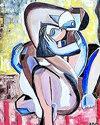GENDER AND RACE IN THE MODERNIST MIDDLEBROW
IF 0.3
4区 社会学
0 HUMANITIES, MULTIDISCIPLINARY
ANGELAKI-JOURNAL OF THE THEORETICAL HUMANITIES
Pub Date : 2022-07-04
DOI:10.1080/0969725X.2022.2093957
引用次数: 0
Abstract
Abstract This article marks a decisive step towards the recovery of the French woman writer, journalist, and aviation pioneer Louise Faure-Favier, who today is virtually forgotten. The article begins by situating the author, and her recovery, within wider international currents of recent feminist scholarship into neglected and lost modernist “middlebrow” women writers. I then move to analyse Faure-Favier’s innovative modernist exploration of the themes of gender and race, focusing on Blanche et Noir (1928), a novel which connects feminism, race, and aviation technology in startlingly original ways; this section of the analysis also directly engages with historical and theoretical discussions of the phenomenon of the “human zoo.” The final phase of analysis considers at length how Faure-Favier’s novel anticipates Bhabha’s mimicry through its identification of the subversive potential of a generation who, in the postcolonial era, will be understood after Bhabha as mimic men. Faure-Favier’s colonial novel offers potential for a significant expansion of Bhabha’s postcolonial – and uniquely masculine – model through consideration of how gender might interact with mimicry, advancing an argument for a strategic coalition between white women and black men which simultaneously reveals the innovations and contradictions which structure her novel and wider thinking. Faure-Favier’s novel emerges as remarkable in its preoccupation with foregrounding the subversive agency of both women and colonized men. More broadly, this consideration of mimicry in the French colonial context generates new frameworks for the interpretation of complex historical figures. Through the rediscovery of Blanche et Noir, this article offers a decisive account of the previously unrecognized achievements of female modernist authors across Europe who engaged with categories of gender, race, and class in groundbreaking ways, thus leading to a significant shift in the existing understanding of gender, race, and modernism.现代主义中的性别与种族
这篇文章标志着法国女作家、记者和航空先驱路易丝·福尔-法维尔走向复苏的决定性一步,她今天几乎被遗忘了。文章首先将作者和她的恢复置于最近女权主义学术的更广泛的国际潮流中,成为被忽视和迷失的现代主义“中产阶级”女性作家。然后,我开始分析福尔-法维尔对性别和种族主题的创新的现代主义探索,重点是《黑色与Blanche et Noir》(1928),这部小说以惊人的新颖方式将女权主义、种族和航空技术联系起来;这一部分的分析也直接涉及到对“人类动物园”现象的历史和理论讨论。分析的最后阶段详细考虑了福尔-法维尔的小说是如何通过对一代人的颠覆潜力的识别来预测巴巴的模仿的,在后殖民时代,这一代人将被理解为巴巴之后的模仿者。fauer - favier的殖民小说通过考虑性别如何与模仿相互作用,为巴巴的后殖民和独特的男性化模式提供了重要扩展的潜力,提出了白人女性和黑人男性之间战略联盟的论点,同时揭示了构成她的小说和更广泛思想的创新和矛盾。福尔-法维尔的小说引人注目之处在于,它专注于突出女性和被殖民男性的颠覆力量。更广泛地说,这种对法国殖民背景下的模仿的考虑为解释复杂的历史人物产生了新的框架。通过对《白与黑》的重新发现,本文对欧洲女性现代主义作家以前未被承认的成就进行了决定性的描述,这些女性现代主义作家以开创性的方式参与了性别、种族和阶级的分类,从而导致了对性别、种族和现代主义的现有理解的重大转变。
本文章由计算机程序翻译,如有差异,请以英文原文为准。
求助全文
约1分钟内获得全文
求助全文
来源期刊

ANGELAKI-JOURNAL OF THE THEORETICAL HUMANITIES
HUMANITIES, MULTIDISCIPLINARY-
CiteScore
0.60
自引率
33.30%
发文量
57
期刊介绍:
Angelaki: journal of the theoretical humanities was established in September 1993 to provide an international forum for vanguard work in the theoretical humanities. In itself a contentious category, "theoretical humanities" represents the productive nexus of work in the disciplinary fields of literary criticism and theory, philosophy, and cultural studies. The journal is dedicated to the refreshing of intellectual coordinates, and to the challenging and vivifying process of re-thinking. Angelaki: journal of the theoretical humanities encourages a critical engagement with theory in terms of disciplinary development and intellectual and political usefulness, the inquiry into and articulation of culture.
 求助内容:
求助内容: 应助结果提醒方式:
应助结果提醒方式:


